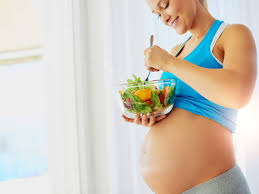A Guide to Healthy Eating During Pregnancy
Pregnancy is a remarkable and transformative time in a woman’s life, marked by profound physical and emotional changes. As you embark on this incredible journey, it’s essential to prioritize not only your well-being but also the health of the developing fetus. Nutrition emerges as a cornerstone in ensuring a healthy pregnancy, playing a pivotal role in fetal growth, development, and overall maternal health.
The significance of a balanced and nutritious diet during pregnancy cannot be overstated. It’s a time when the body’s nutritional demands are heightened, requiring an increased intake of essential nutrients such as folic acid, iron, calcium, and various vitamins. These nutrients are crucial for the formation of the baby’s organs, bones, and overall well-being. Therefore, adopting a diet rich in a variety of fruits, vegetables, whole grains, lean proteins, and dairy products becomes imperative.
Beyond the physical aspects, the emotional well-being of the expectant mother is equally vital. Hormonal fluctuations and the anticipation of impending motherhood can bring about various emotional states. Nutrition, with its direct impact on mood and energy levels, becomes a tool for promoting mental health during this delicate period. Incorporating foods that support emotional well-being, such as those rich in omega-3 fatty acids and complex carbohydrates, can contribute to a more positive and stable mental state.
Navigating the nutritional landscape during pregnancy might seem complex, considering the multitude of information available. Consulting with a healthcare professional or a nutritionist is highly advisable to create a personalized and comprehensive dietary plan that aligns with individual health needs and preferences.
Healthy Eating During Pregnancy
The Foundation: Nutrient-Rich Foods
A pregnant woman’s body undergoes numerous changes to support the growth and development of the baby. To ensure you and your baby receive the necessary nutrients, focus on a diet rich in:
- Fruits and Vegetables: Packed with vitamins, minerals, and fiber, these are the cornerstone of a healthy diet. Aim for a colorful variety to get a broad spectrum of nutrients.
- Whole Grains: Opt for whole grains like brown rice, quinoa, and whole wheat bread. They provide essential nutrients and fiber to keep you feeling full and satisfied.
- Lean Proteins: Include lean sources of protein such as poultry, fish, beans, and tofu. Protein is crucial for the development of your baby’s organs, muscles, and tissues.
- Dairy or Dairy Alternatives: Ensure an adequate intake of calcium for the development of your baby’s bones and teeth. Choose low-fat or fat-free options for a healthier choice.
- Healthy Fats: Incorporate sources of healthy fats, such as avocados, nuts, and olive oil. These provide essential fatty acids necessary for your baby’s brain development.
Hydration is Key
Staying well-hydrated is crucial during pregnancy. Water helps transport nutrients to your baby, aids in digestion, and helps prevent constipation—a common issue during pregnancy. Aim for at least eight glasses of water per day and more if you’re active or experiencing warmer weather.
Managing Portions and Frequency
Rather than focusing solely on three large meals a day, consider spreading your food intake across five to six smaller meals. This can help manage nausea and prevent overeating. Listen to your body’s hunger and fullness cues and eat when you’re hungry.
Foods to Limit or Avoid
While it’s essential to embrace nutrient-dense foods, there are certain items to limit or avoid during pregnancy:
- Caffeine: Moderate your caffeine intake. High levels of caffeine have been linked to an increased risk of miscarriage. Opt for decaffeinated beverages when possible.
- Raw or Undercooked Foods: To reduce the risk of foodborne illnesses, avoid raw or undercooked seafood, eggs, and meats. Ensure that all meats are cooked to a safe internal temperature.
- High-Mercury Fish: Limit your intake of high-mercury fish, such as shark, swordfish, king mackerel, and tilefish. Opt for safer choices like salmon and trout.
- Processed Foods: Minimize processed foods and focus on whole, nutrient-dense options. Processed foods often contain high levels of salt, sugar, and unhealthy fats.
Consultation with Healthcare Providers
Every pregnancy is unique, and individual needs may vary. It’s crucial to maintain open communication with your healthcare provider regarding your diet and any dietary supplements. Your healthcare team can provide personalized guidance based on your health, lifestyle, and specific nutritional requirements.
In conclusion, a well-balanced and nutritious diet plays a vital role in ensuring a healthy pregnancy for both you and your baby. By making mindful food choices, staying hydrated, and consulting with your healthcare provider, you can nourish your body and embrace this extraordinary journey with confidence.
For detailed information and online consultation visit vituras.











